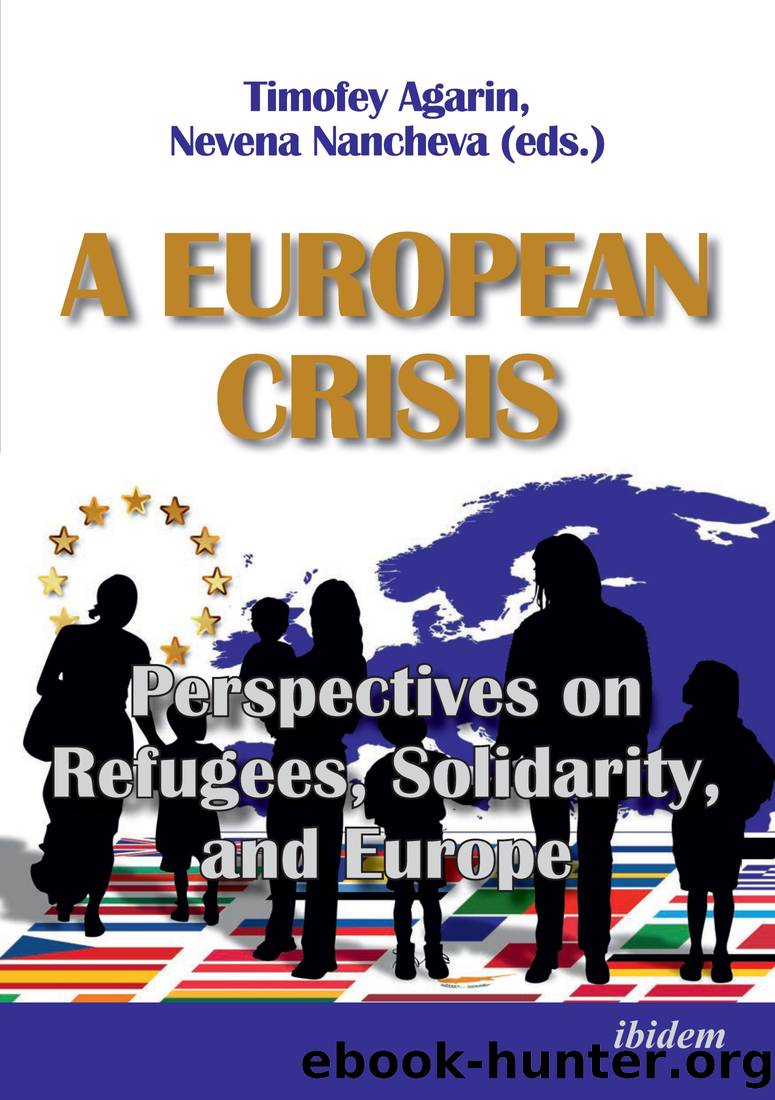A European Crisis: Perspectives on Refugees, Solidarity, and Europe by unknow

Author:unknow
Language: eng
Format: epub
Tags: Nonfiction, Social & Cultural Studies, Political Science
ISBN: 9783838271248
Amazon: B078B5DMGW
Goodreads: 39818631
Publisher: ibidem
Published: 2018-03-30T04:00:00+00:00
The Vanishing European Dream:
The Double Crisis of Migration and European (Dis)Integration
Cvete Koneska
Independent Researcher
The political mood in Europe has changed. After almost two decades of political optimism and enthusiasm over the European Union (EU) enlargement since fall of the Berlin Wall in 1989, the rhetoric and expectations are substantially more sombre. Both politicians and populations appear to have become more cautious about the future of the European political project, as well as the benefits from widening and deepening European integration. In stark difference to their predecessors in the early 1990s, few politicians in the EU openly call for further political integration in the EU and fewer still talk enthusiastically about expanding the EU further east.
Populations too, are increasingly turning towards anti-establishment and populist parties, both on the left and the right of the political spectrum. Many of these parties, newcomers to the political stage, are also anti-EUâadvocating their countriesâ withdrawal from the EU, or from various EU common policies, or re-claiming of different rights relinquished to EU bodies. For example, much of the appeal of leftist political parties such as Syriza in Greece and Podemos in Spain lies in their rejection of the Eurozone and its institutionsâ oversight over the economies of the member-states. Counterintuitively, the rightist AfD in Germany also calls for abandoning the Eurozone, as they claim it is to Germanyâs disadvantage. Similarly, in the United Kingdom (UK), the UK Independence Party (UKIP) successfully campaigned for the UK to leave the EU. Although Euro-scepticism in the rest of the EU is not as pronounced or potent as in the UK, undoubtedly there is a trend of growing discontent with the EU and an overall weakening support of the EU and what it stands for.
This trend is not wholly new. Policy and academic debates on the state of the EU and European integration over the past twenty years have sporadically engaged with the EUâs so-called âdemocratic deficitâ1 and proposed ways to reform the EU to bring it closer to ordinary EU citizens. Whether because such attempts to address EUâs lack of democratic credentials have failed to achieve their goals or because other, more powerful, factors are behind the growing populist turn across Europe we are now witnessing a peak in political and popular backlash against the EU.
This raises several questions about the impact of the current multiple crises on the future form and direction of European integration. It is important to think about the future of the EU project and European integration not only as a political project bringing together (the remaining) 27 member-states, but also because of the influence the bloc has had outside its borders. Most directly, the EU has shaped the politics of its closest neighbours, the states in the Western Balkans, which as aspiring members of the EU have seen their political trajectories closely align with those of the EU. What happens in the EU strongly resonates in the Western Balkans.
This paper explores this relationship in the light of the recent developments in the EU, specifically
Download
This site does not store any files on its server. We only index and link to content provided by other sites. Please contact the content providers to delete copyright contents if any and email us, we'll remove relevant links or contents immediately.
The Goal (Off-Campus #4) by Elle Kennedy(13027)
Kathy Andrews Collection by Kathy Andrews(11098)
Diary of a Player by Brad Paisley(7107)
What Does This Button Do? by Bruce Dickinson(5804)
Assassin’s Fate by Robin Hobb(5657)
Big Little Lies by Liane Moriarty(5303)
Altered Sensations by David Pantalony(4712)
Pale Blue Dot by Carl Sagan(4403)
Sticky Fingers by Joe Hagan(3724)
The Death of the Heart by Elizabeth Bowen(3181)
The Heroin Diaries by Nikki Sixx(3177)
Beneath These Shadows by Meghan March(2998)
Confessions of a Video Vixen by Karrine Steffans(2966)
The Help by Kathryn Stockett(2889)
How Music Works by David Byrne(2829)
Jam by Jam (epub)(2747)
Harry Potter 4 - Harry Potter and The Goblet of Fire by J.K.Rowling(2654)
Strange Fascination: David Bowie: The Definitive Story by David Buckley(2581)
Petty: The Biography by Warren Zanes(2447)
